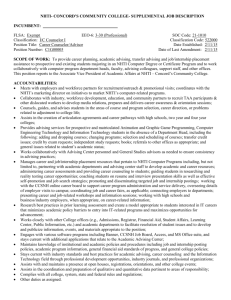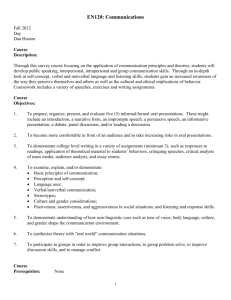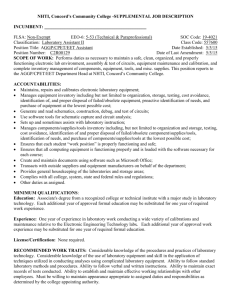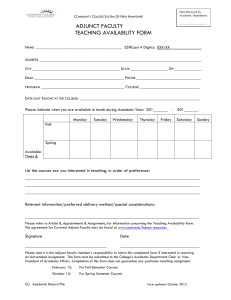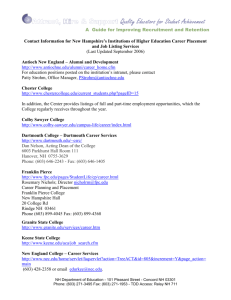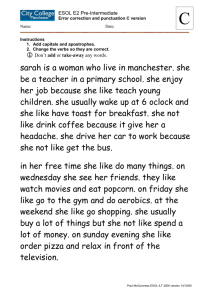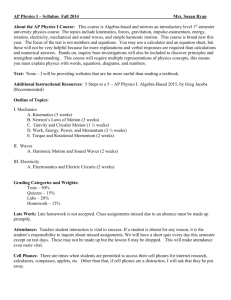New Hampshire Technical Institute
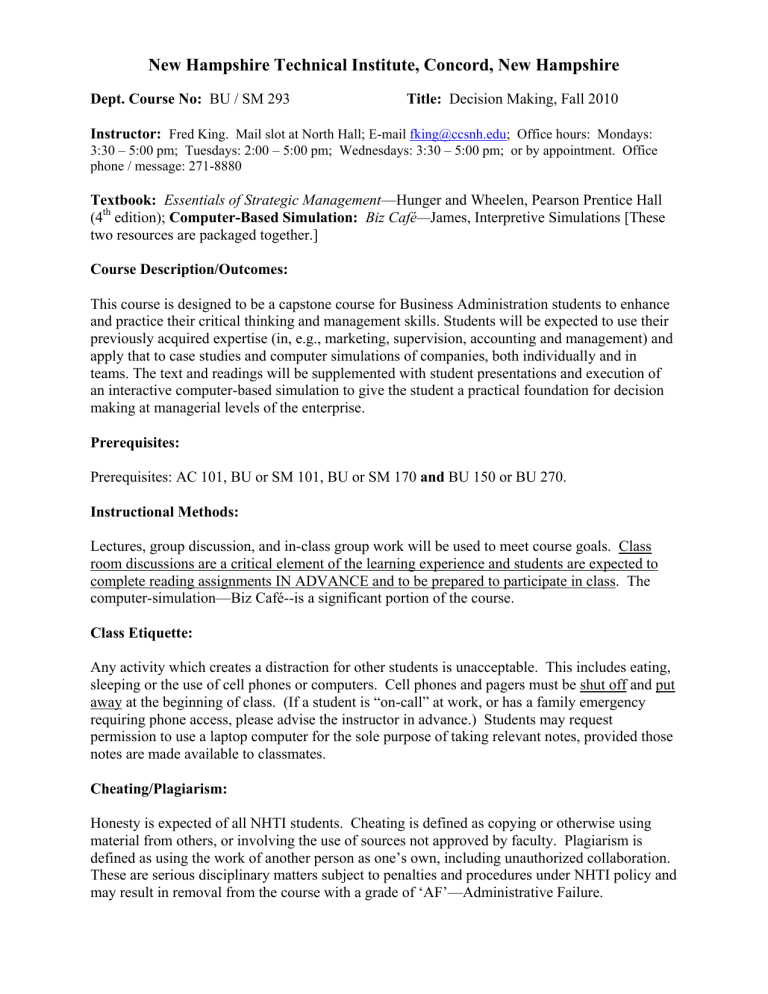
New Hampshire Technical Institute, Concord, New Hampshire
Dept. Course No: BU / SM 293 Title: Decision Making, Fall 2010
Instructor: Fred King. Mail slot at North Hall; E-mail fking@ccsnh.edu
; Office hours: Mondays:
3:30 – 5:00 pm; Tuesdays: 2:00 – 5:00 pm; Wednesdays: 3:30 – 5:00 pm; or by appointment. Office phone / message: 271-8880
Textbook: Essentials of Strategic Management
—Hunger and Wheelen, Pearson Prentice Hall
(4 th
edition); Computer-Based Simulation: Biz Café— James, Interpretive Simulations [These two resources are packaged together.]
Course Description/Outcomes:
This course is designed to be a capstone course for Business Administration students to enhance and practice their critical thinking and management skills. Students will be expected to use their previously acquired expertise (in, e.g., marketing, supervision, accounting and management) and apply that to case studies and computer simulations of companies, both individually and in teams. The text and readings will be supplemented with student presentations and execution of an interactive computer-based simulation to give the student a practical foundation for decision making at managerial levels of the enterprise.
Prerequisites:
Prerequisites: AC 101, BU or SM 101, BU or SM 170 and BU 150 or BU 270.
Instructional Methods:
Lectures, group discussion, and in-class group work will be used to meet course goals. Class room discussions are a critical element of the learning experience and students are expected to complete reading assignments IN ADVANCE and to be prepared to participate in class. The computer-simulation—Biz Café--is a significant portion of the course.
Class Etiquette:
Any activity which creates a distraction for other students is unacceptable. This includes eating, sleeping or the use of cell phones or computers. Cell phones and pagers must be shut off and put away at the beginning of class. (If a student is ―on-call‖ at work, or has a family emergency requiring phone access, please advise the instructor in advance.) Students may request permission to use a laptop computer for the sole purpose of taking relevant notes, provided those notes are made available to classmates.
Cheating/Plagiarism:
Honesty is expected of all NHTI students. Cheating is defined as copying or otherwise using material from others, or involving the use of sources not approved by faculty. Plagiarism is defined as using the work of another person as one‘s own, including unauthorized collaboration.
These are serious disciplinary matters subject to penalties and procedures under NHTI policy and may result in removal from the course with a grade of ‗AF‘—Administrative Failure.
Course Schedule
Week Meeting
Day
1
2
3
4
5
6
7
8
9
10
11
12
13
August 30
September
6
September
13
September
20
Textbook Reading Assignment
Chapter 1—Basic Concepts of
Strategic Management
Chapter 2—Corporate
Governance and Social
Responsibility
September
27
October 4 Chapter 4—Internal Scanning:
Organizational Analysis
October 11
Chapter 3—Environmental
Scanning and Industry Analysis
November
15
Chapter 8—Strategy
Implementation: Staffing and
Leading
Biz Café Week
Rvw. Reports; Week 9 decisions
Assignment(s) Due
Introduction; Team
Assignments; Review
Online Manual
Startup decisions and Week
1 decisions (3 selfadvanced, practice)
Rvw. Reports; Week 2 decisions (3 self-advanced, practice)
Rvw. Reports; Revised
Startup decisions and Week
1 decisions
Rvw. Reports; Week 2 decisions
Rvw. Reports; Week 3 decisions
Rvw. Reports; Week 4 decisions
On-Line Quiz completed
First Weekly Team email
Second Weekly Team email
Third Weekly Team email
Test on Chapters 1 – 4
Fourth Weekly Team email
Fifth Weekly Team email;
October 18 Chapter 5—Strategy
Formulation: Situation Analysis and Business Strategy
October 25
November
1
November
8
Chapter 6—Strategy
Formulation: Corporate Strategy
Chapter 7—Strategy
Formulation: Functional Strategy and Strategic Choice
Strategic Audit Coaching
Rvw. Reports; Week 5 decisions
Rvw. Reports and Financial
Statements; Week 6 decisions;
Rvw. Reports; Week 7 decisions
Rvw. Reports; Week 8 decisions
Sixth Weekly Team email
Seventh Weekly Team email
Test on Chapters 5 – 7;
Eighth Weekly Team email;
Ninth Weekly Team email;
Preliminary Draft of
S.A.;
14
15
16
November
22
November
29
December
6
December
13
Chapter 9—Strategy
Implementation: Staffing and
Leading
Chapter 10—Evaluation and
Control
Rvw. Reports and Financial
Statements;
Collaborate on Group
Presentations
Group Presentations
Final Exam
**NOTE: No Monday evening class September 6th.
Test on Chapters 8 – 10
Final Strategic Audit
Course Grading Matrix
Item Due Date Criteria
On-Line Quiz September
13
Test 1
Test 2
½ Point for each correct answer (only for quizzes completed on time)
October 11 Assessment of learnings from text, lecture and any
A/V materials—Chapters 1-4
November
8
Assessment of learnings from text, lecture and any
A/V materials —Chapters 5-7
Strategic Audit
Draft
November
22
750 word overview of Strategic Audit, summarizing current strategy, emphasizing SWOT, and previewing possible alternative strategies. Loss of one (1) point for each calendar day late. (E-mail is not acceptable.)
Test 3
Final Strategic Audit
December 6
December 6 Assessment of learnings from text, lecture and any
A/V materials —Chapters 8-10
2500 (minimum) word analysis of a company applying the semester‘s theory and vocabulary to a
Excellent. 90-100%.
Top 15%
Good. 80-89%. publicly traded U. S. company. A visual template which serves as an outline is in Figure 1.3 on pages
14-15 of the text. Sample S/A‘s will be posted on
Above average.
Average. 70-79%.
Meets minimal criteria.
Poor. 60-69%.
Misses some criteria.
Fails to meet substantial criteria.
Weekly Team e-mails
Final BizCafe
Team
PowerPoint
Blackboard.
Comprehensive application of theory and vocabulary from all 10 chapters of Hunger/Wheelen.
Document construction: Spelling, grammar, capitalization, use of APA formatting.
Professional appearance and enhancements, e.g., bulleting, bold headings, logos or other art,
Charts, e.g., SFAS (Figure 5.1) or BCG Matrix
Sept 20 –
Nov 15
(Figure 6.2) and Key Financial Data Points (NOT cut and pasted!)
One point each for reports that are reasonably informative and submitted on time.
December 6 This presentation summarizes the team‘s experience and decisions during the course of the BizCafe simulation. It should address the Income Statement
Final Exam
Participation
December
13
Full
Semester and Balance Sheet as well as successes and learnings along the course.
This assesses the full measure of the student‘s accumulated learning over the course of the semester.
This reflects the student‘s apparent preparation for
Attendance
TOTAL
Present and
On time class, contributions during class, and team contributions during BizCafe (which is partially affected by peer reviews in the simulation).
Loss of five points for each absence. (Lates are considered ½ absence) Student receives
Administrative Failure upon exceeding -15 points.
A = 90 – 100 (Excellent--Top 10%)
B = 80 – 89 (Good--Above Average)
C = 70 – 79 (Meets Criteria--Average)
D = 60 – 69 (Misses Criteria--Below Average)
F = < 60 (Fails to Meet Criteria)
Possible
Points
5
10
10
5
Points
Awarded
10
5
5
5
5
10
10
15
10
105
NHTI ACADEMIC AFFAIRS NOTICES
for inclusion with all course syllabi
COURSE DROP/WITHDRAWAL AND REFUND
A course must be dropped by notifying the Registrar's Office (for day classes) or the Division of Continuing Education
(for evening classes) prior to the end of the eighth calendar day of the semester in order to receive a 100% refund of tuition, less non-refundable fees. After that time, the student may submit a DROP form to the Registrar's Office but no refund will be granted. Ceasing to attend a class does not constitute an official drop or withdrawal and may result in a grade of "F'". Officially dropping a course prior to the completion of 60% of the scheduled duration of a course will result in a grade of "W". After that time, a grade of "WP" or "WF" will be issued depending on the student's standing at the time of the drop. Note: Dates are prorated for courses offered in an alternative format; contact the Registrar or
Division of Community Education for details. Dates for the 2010-2011 Academic Year are as follows:
Fall 2010 Spring 2011
September 7* January 25*(except on line)
November 4 March 31
Last day to drop with a full refund
Last day to withdraw with a grade of
"W'
CLASSROOM ETIQUETTE
Academic integrity is of primary importance in the classroom. Both students and faculty are responsible for creating and maintaining an environment that supports effective instruction. It is therefore imperative that students and faculty demonstrate mutual respect. Inappropriate behavior in the classroom may compromise the learning and performance of all students present. Such inappropriate behaviors include, but are not limited to: late arrivals/early departures; loud or prolonged side conversations; use of cell phones, computers (other than for legitimate academic use), iPODs (or similar devices), etc.; use of derogatory or vulgar language. All students are expected to abide by the Student Code of Conduct, published in the NHTI Student Handbook, and are subject to sanctions as described therein for any violations.
CIVIL RIGHTS/EQUITY ISSUES
(discrimination and harassment)
NHTI – Concord’s Community College does not discriminate in the administration of its admissions, educational programs, activities, or employment practices on the basis of race, color, religion, national origin, age, sex, handicap, veteran status, sexual orientation, or marital status. The college is sensitive to the fear and/or embarrassment an individual may experience in coming forward with a complaint regarding discrimination. The grievance reporting procedures outlined in the Student and Employee Handbooks are designed to provide a safe, confidential, and supportive environment in which an individual may discuss his/her concerns. Any NHTI student, employee, or visitor who has observed, is aware of, or has been a victim of discriminatory or harassing behavior while engaged in an NHTIsponsored activity should report such behavior to the Civil Rights/Equity Coordinator (Kathleen Dotter, North Hall
Room N106, kdotter@ccsnh.edu
271-6960) or other Institute representative.
THE LEARNING CENTER
The Learning Center, located in the library, provides free academic assistance to all NHTI students who would like to improve their grades. The LC offers peer tutoring in most subjects; professional drop-in tutoring in writing, math, study skills & critical reading, and A&P/biological sciences; Disabilities Services; and a computer learning lab. For more information, call 271-7725 or check the LC web site .
DISABILITIES SERVICES
Students with documented disabilities are eligible to receive reasonable accommodations that address individual learning needs. To receive services, students must contact the Coordinator of Disabilities Services, whose office is in the
Learning Center. For details, please refer to the Policies and Procedures Manual for Services Available for Students with Disabilities , which is available in print and on the NHTI Web site (www.nhti.edu).
Students with documented disabilities should be aware that simply noting in writing or in discussions with faculty that one’s disability affects academic skills does NOT constitute formal disclosure of a disability. Once a student develops a
Reasonable Accommodation Plan (RAP) with the Coordinator of Disabilities Services, that student is responsible for discussing the RAP with the instructor. Students should make requests for specific accommodations at least one week prior to when the accommodations are needed. Call Beverly Boggess at 271-7723 or e-mail her at bboggess@ccsnh.edu
for more information
CROSS-CULTURAL EDUCATION and
ENGLISH-for SPEAKERS-of-OTHER-LANGUAGES (ESOL) SERVICES
The Director of Cross-Cultural Education and the ESOL Coordinator, located in Sweeney Hall, Room S301, work together to provide the tools necessary for successful integration of cultures, whether for academic or business purposes.
Students may arrange to take the TOEFL exam or the institutional ESOL assessment test at NHTI to allow for appropriate course registration and ESOL course placement. ESOL courses are offered for college credit throughout the year. A gradual merging process allows students to take ESOL courses and courses required in the chosen program simultaneously. Individual tutoring in ESOL and other test-taking accommodations can be arranged through the ESOL
Coordinator. Programs are also offered that assist members of the international and immigrant communities to better understand American culture and that help the community develop awareness and understanding of the growing diversity of our communities. Call 271-8928 for more information.
PLAGIARISM/CHEATING POLICY
As stated in the Student Handbook: Honesty is expected of all NHTI students. In academic matters this includes the submission of work that clearly indicates its source. Dishonest acts include cheating and plagiarism. Cheating includes, but is not limited to: (1) use of any unauthorized assistance from other persons or technologies in taking quizzes, tests, or examinations or in the preparation and completion of class assignments; (2) dependence upon the aid of resources beyond those authorized by the instructor in writing papers, preparing reports, solving problems, or carrying out other assignments;
(3) the acquisition, without permission, of tests or other academic material belonging to a member of the CCSNH colleges faculty, staff, or students; or (4) knowingly providing unauthorized assistance of any kind to another for the purpose of providing unfair advantage to the recipient in the completion of course assessments/assignments (sometimes known as facilitation ). Plagiarism includes, but is not limited to, the use (intentional or unintentional), by paraphrase or direct quotation, of the published or unpublished work of another person without full and clear acknowledgment. It also includes the unacknowledged use of materials prepared by another person or agency engaged in providing term papers or other academic materials via direct sale, barter, or other means.
Cheating and plagiarism are considered serious disciplinary matters and are subject to the same penalties and procedures as other NHTI disciplinary matters. Students should be aware that penalties levied in proven cases of cheating or plagiarism may include the issuance of a grade of AF (which may in turn lead to delay of graduation), suspension or dismissal from a program or from the college, or other sanctions as deemed appropriate.
CANCELLATION/DELAYED START OF CLASSES
When the President deems it prudent to cancel all classes at the college, students will receive a notice via their college email address using the NHTI Alerts Notification System. (To receive Alerts messages via other addresses/phone numbers, sign up at www.nhti.edu
.) An announcement will also be made on WMUR-TV (Channel 9) and local radio stations and will be posted to the NHTI Web site. Students checking the Web page for cancellation announcements should be aware that the page must be repeatedly “refreshed” to obtain the latest information.
Occasionally, the President will opt for a delayed start to classes. This means that students should be prepared to begin their school day with whatever activity they would normally be doing at the announced opening time. For example, if a two-hour delay is announced, and a student is scheduled for a class that normally meets from 8:00-10:50 AM, the student should come to that class at 10:00 AM for the remaining 50 minutes of class; classes that are normally completed before 10:00 AM would be cancelled.
GRADE REPORTING
Faculty submit grades electronically to the Registrar’s Office within a few days following the end of each final exam period. FINAL GRADES ARE NOT MAILED to students. It is the student’s responsibility to review his/her final grades via the Student Information System as soon as grades are available. Students who receive an “I” (Incomplete) grade should coordinate with the instructor to complete the remaining coursework as soon as possible. Unresolved “I” grades will convert to an “F” (Failing) grade automatically at the end of the third week of the following semester. A grade of Incomplete will place a student's financial aid status on hold for the subsequent semester. Consult the NHTI catalog for the full “Incomplete Grade Policy.”
STUDENT ATHLETES
NHTI values its student athletes and wants them to be successful both on the field/court and off. Therefore, student athletes participating on any NHTI-sponsored team MUST provide each of their instructors with documentation from the NHTI Athletic Department confirming their participation on a team, as well as the schedule of practices and games, within the first week of the semester or immediately upon joining a team (if joining after the semester begins) to receive consideration for excused absences, make-up testing, or other sorts of accommodations related to the team schedule.
This documentation must be presented in advance of any special requests.
Participation on an NHTI-sponsored team does not excuse any student from compliance with any/all course requirements. Faculty are not required to excuse students from class or lab to attend practice sessions, and there may be circumstances (such as clinical requirements) under which athletes may not be excused for games, though every effort will be made to accommodate the schedules of student athletes who work responsibly with their instructors.
STUDENT EMAIL
Official Community College System of New Hampshire (CCSNH) email accounts will be created automatically for all enrolled students at the time of course registration. This is the only email address that will be recognized by NHTI for
any required correspondence in NHTI-controlled courses and will serve as the official account for ALL of your electronic communication with the college. This practice will ensure that all students are able to comply with the emailbased requirements specified by faculty. Students are responsible for checking their official student email regularly and reading college-related communications. The electronic mail system is college property. Additionally, all messages composed, sent, or received on the electronic mail system are and remain the property of CCSNH or NHTI. The
CCSNH electronic mail system is not to be used to create or forward any offensive messages. CCSNH is not responsible for the handling of email by outside vendors.
Students must meet the requirements of all academic policies.
Therefore, students are expected to acquaint themselves with these policies by visiting the college’s Web site at: http://www.nhti.edu/academics/academicrequirements.html
